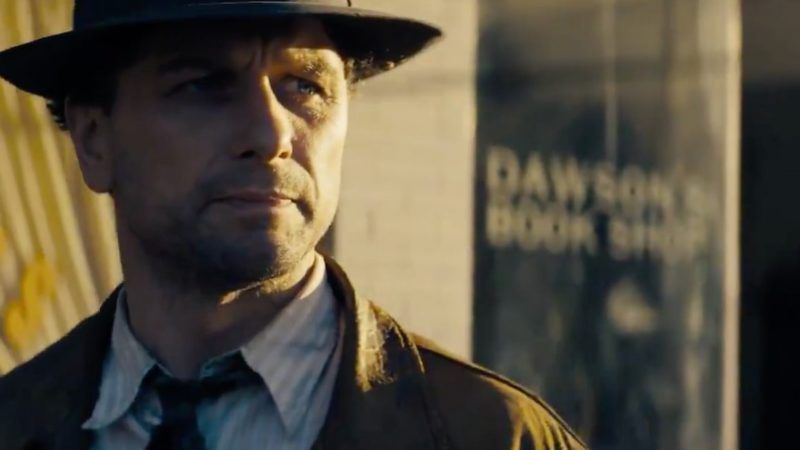Perry Mason Gets Its Mandatory Gritty Reboot
Matthew Rhys stars in an adaptation with pretty much no resemblance to its origins.

Perry Mason. HBO. Sunday, June 21, 9 p.m.
Meet the new Perry Mason. The old one was one of the most remarkably stable—and square—characters in American entertainment culture. Through more than 80 novels and short stories by Erle Stanley Gardner, six Warner Brothers films, 271 television episodes starring Raymond Burr, 15 more in an abortive reboot with Monte Markham, 253 radio shows, and uncounted TV movies, cartoons, and comic strips, Mason for the past nine decades has been not only the nation's foremost criminal defense attorney, but its most upright, rarely bending and never breaking a rule while winning approximately all of his cases.
He's so squeaky clean that during hearings on her nomination to the Supreme Court, Sonia Sotomayor was able to cite Mason as her primordial source of legal thought without fear of scandal. (Sotomayor may have been influenced by the fact Mason was among the first American attorneys to get an ethnicity transplant when his radio self briefly turned Hispanic during the 1940s.)
The hero of HBO's new miniseries Perry Mason is an altogether different fellow who shares practically nothing with his earlier incarnations but the name. He's not even a lawyer but a sleazy private investigator who works "on the bottom, feeding off runaways and cheaters," as a sneering cop remarks with considerable accuracy, and isn't above a little blackmail when the opportunity presents itself.
Clad in a perpetual five o'clock shadow and a grubby wardrobe purchased second-hand from the city morgue ("I've got a domestic stabbing with a three-piece if you want," offers an attendant), the broke Mason lives in a half-wrecked farmhouse next to a cropduster airstrip ("a two-cow dairy in the middle of an airport," he describes it) even shabbier than his ethics. Unlike most noir detectives, he's not even proficient with his fists; he doesn't serve knuckle sandwiches, just eats them.
How a skid-row character like this makes an appealing or even interesting protagonist is a mystery far more puzzling than any of the cases Mason takes on, yet he does. Just as he did in his signature role as a ruthless KGB spy in The Americans, Matthew Rhys uses self-mocking wit and caustic charisma to make you love a guy who is not the least bit lovable. Perry Mason is the ugliest fun-to-watch show (or perhaps the funnest-to-watch ugly show, I don't know) since Showtime's cuddly serial-killer-next-door series Dexter left the air nearly a decade ago, and the cracked side of America's national psyche will be the better for it.
It helps that series creators Ron Fitzgerald and Rolin Jones (whose previous producing credits include a lot of high-end TV like Friday Night Lights and Boardwalk Empire) have elected to set this Perry Mason in Depression-era Los Angeles, where the landscape—dappled with dazzling sunshine, big money, Hollywood salacity and police malfeasance—makes it the perfect backdrop for noir cynicism. Even the restaurants are sardonic: The show opens in one called Ptomaine Tommy's.
It's there that the Dodsons, a working-class couple, are waiting for the ransomed return of their abducted 1-year-old child, Charlie. What they get instead is his corpse—eyes sewn open to make it look more lifelike—and a horde of police investigators who think the whole thing was a scam-gone-wrong perpetrated by the couple themselves. A wealthy friend hires moneyed attorney Elias Birchard (John Lithgow) to conduct a private investigation, and he in turns puts Mason and his equally scruffy sidekick Pete Strickland (Shea Whigham, Boardwalk Empire), on the payroll for field work. Also helping and/or hindering the probe are Paul Drake (Chris Chalk, Gotham), one of the few black cops in the profoundly racist LAPD, and Della Street (Juliet Rylance, The Knick), Birchard's crime-busting receptionist.
Mason warns that the case is going to be a "long, long, deep, dark tunnel," and he's right; both Dodsons are lying to protect secrets, and police intransigence blocks the investigation at every turn. So does Mason's blotchy personal life. Though neither the novels nor the nine-season TV run of Perry Mason ever revealed much about the background or outside-the-office life of their hero, HBO's version is wildly confessional.
Mason has a vengeful ex-wife, a son he's not allowed to visit or even speak to, a girlfriend who may be a hooker, and a cow with a death wish. He's about to lose what remains of his home. He's got PTSD from World War I, when he was discharged from the army for some murky but apparently undistinguished reason. His investigations rely less on deductive skills than lockpicks and covert photography, and he lives by the motto, "Everybody's up to something, and everybody is guilty." When a coroner warns him that that the corpse he's about to view is "the worst thing you've ever seen," Mason bitterly retorts: "How do you know what I've seen?" In Perry Mason, you can always count on something worse.


Show Comments (32)